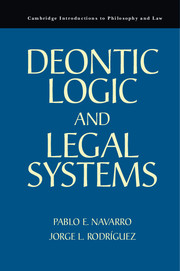4 - Legal Systems and Legal Validity
Published online by Cambridge University Press: 05 October 2014
Summary
Normative Systems and the Existence of Norms
In the preceding chapter we pointed out the importance of distinguishing norms from norm-propositions. Although there are notable difficulties regarding the possibility of a genuine logic of norms, it is relatively uncontroversial that logic can be applied to norm-propositions, understood as propositions about the membership of a certain norm in a normative system. Concerning this last question, the problems are not so much about the very possibility of applying logic to norm-propositions, but rather about whether the logic of norm-propositions is something different from a genuine logic of norms, or whether the logic of norm-propositions is a special kind of logic or, by contrast, is no more than a fragment of classical logic.
One way to show the relevance of the logic of norm-propositions as something different from a logic of norms is through the analysis of the logical consequences of normative systems, particularly their logical properties, such as coherence and completeness. In what follows, we apply this analysis to a particular kind of normative systems: legal systems.
- Type
- Chapter
- Information
- Deontic Logic and Legal Systems , pp. 117 - 149Publisher: Cambridge University PressPrint publication year: 2014

